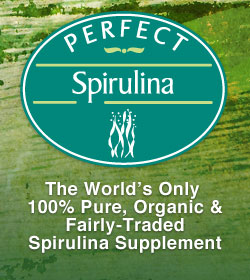 As the Old Saying Goes… "One Man's Pond Scum Is Another Man's Superfood"
As the Old Saying Goes… "One Man's Pond Scum Is Another Man's Superfood"
Okay, maybe that is not exactly how the saying goes – but it should be when it comes to Spirulina. Spirulina, a water plant, does not look like much when sitting in a pond, but put it under a microscope and it really starts to shine!
In this article, we will introduce you to the wonderful world of Spirulina. We will try to keep scientific jargon to a minimum, for fear of boring you to death. Let's jump in…
What Exactly Is Spirulina?
Spirulina is a blue-green algae. If you want to get technical about it, it is a microscopic algae, so it is called a microalgae. What's that? Not technical and boring enough – fine try this one… Spirulina (technically Spirulina platensis), is a spiral shaped multicellular blue-green microalgae. Spirulina, one of the planet's most ancient forms of plant life, grows in the water - both fresh water and sea water. The blue-green color of Spirulina comes from the high concentration of something called phycocyanin.
Get Your Cursor off the X in the Browser, It Gets Better!
I am with you, learning about microalgae is not my idea of a good time. However, learning about the incredible nutrients that are inside the Spirulina microalgae is pretty exciting…
Let's All Pause and Say a Quick Thank You to Mother Nature
In this day and age, it seems like everything is new and improved. Drug companies spend billions of dollars trying to create drugs to treat diseases. Then they spend a few billion more creating drugs to treat the diseases that the first drugs caused!
On the other hand you have tiny little Spirulina that has survived on this planet for over 3.5 billion years. It contains 65% protein, all the essential amino acids and is packed with antioxidants, vitamins, minerals, phytonutrients and GLA. Can we pause for a moment and say thank you to Mother Nature for giving us a true complete super food?
Check Out the Nutritional Properties of Spirulina:
- Contains high concentrations of 18 Vitamins and Minerals
- Rich in Chlorophyll
- 65% of Spirulina is Protein
- Contains ALL essential amino acids
- Rich in gamma-linoleic acid (GLA) - an anti-inflammatory Omega 6 Fatty Acid
- 100x the Vitamin A of Carrots
- 50x the Iron of Spinach
- 10x the Beta Carotene of Carrots
- 7x the Calcium of Milk
- 6x the Protein of Eggs
- 3x More Iron Than Beef
- Rich in Phytonutrients and antioxidants
Nutrients Are Nice But What Will Spirulina Do For Me?
You're right. Having a plant packed with nutrients is a nice start, but what we all really care about is how eating Spirulina might help us feel better. Let's continue on to our next lesson – What Are The Health Benefits of Spirulina








